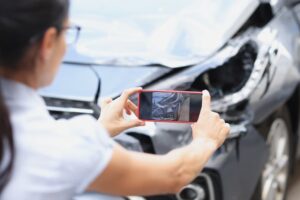Gathering the right evidence is key if you're considering seeking compensation for your injuries and damages. But what exactly counts as helpful evidence? And how can you make sure you're collecting everything you need? This guide will walk you through the types of evidence that can strengthen your car accident case. We'll explore everything from police reports and photos to medical records and witness statements. Understanding what evidence matters can make a huge difference in the outcome of your case. That's why many people choose to work with a Phoenix car accident lawyer who knows exactly what proof can best support your claim. Let's dive in and learn about the evidence to secure the compensation you deserve.
Types of Evidence That Can Help Your Case
Many different kinds of evidence might be useful in a car accident case. Let's talk about some of the most common and important types.- Police Reports
- Pictures and Videos: A Visual Record
- Witness Statements: Other People's Perspectives
- Medical Records: Proving Your Injuries
- Professional Opinions & Professional Insights
- Electronic Data: High-Tech Evidence
- Your Notes and Records
- Vehicle Damage Reports: The Story Told by Your Car
- Insurance Company Records
- Employment Records: Showing Lost income
- Weather Reports: The Role of Mother Nature
- Road Condition Reports
Police Reports
 One of the first things a car accident attorney will likely ask about is the police report. When cops come to the crash scene, they write a detailed report. This document can be extremely valuable for your case. It usually includes important info like:
One of the first things a car accident attorney will likely ask about is the police report. When cops come to the crash scene, they write a detailed report. This document can be extremely valuable for your case. It usually includes important info like:
- The date, time, and location of the accident
- Names and contact details of everyone involved
- Statements from drivers and witnesses
- The officer's thoughts on what caused the crash
- Any tickets given out at the scene
Pictures and Videos: A Visual Record
You know how they say a picture is worth a thousand words? Well, it might be worth even more in a car accident case. Photos and videos taken right after the crash can be helpful evidence. They can show:- Damage to all vehicles involved
- The positions of the cars after the crash
- Skid marks or debris on the road
- Weather conditions at the time
- Your car accident injuries
Witness Statements: Other People's Perspectives
Sometimes, it's not just about what you see or experience. Other people who saw the accident happen can provide valuable information, too. Their statements can help back up your side of the story or provide details you might have missed. Witnesses might include:- Other drivers or passengers
- People walking or biking nearby
- Workers or customers in nearby businesses
Medical Records: Proving Your Injuries
Medical records are key when it comes to showing how the accident has affected you. These documents provide a professional account of your injuries and the treatment you need. They can include:- Emergency room reports
- Doctor's notes
- Test results (like X-rays or MRIs)
- Prescriptions
- Physical therapy records
Professional Opinions & Professional Insights
Sometimes, you need more than just facts and figures. That's where professional opinions come in. These are statements from professionals who can provide specialized knowledge about different aspects of your case. Some examples of professionals who might be helpful include:- Medical Professionals: Doctors or specialists can explain your injuries in detail. They can talk about how the accident caused them, what kind of treatment they'll need, and how they might affect you.
- Accident Reconstruction: Specialists use science and math to determine exactly how a crash happened. They can create detailed reports or even 3D models to show what occurred.
- Economic Consultants: If you've lost income or your ability to work has been affected, economic consultants can calculate how much money you've lost and might lose in the future.
Electronic Data: High-Tech Evidence
In today's digital world, electronic evidence can often help in car accident cases. This might include:- GPS Data: Information from navigation systems can show where vehicles are and how fast they are going.
- Cell Phone Records: These can prove if someone was texting and driving during the crash.
- Traffic Camera Footage: Sometimes, nearby traffic or security cameras might have caught the accident on video.
Your Notes and Records
While professional and technical evidence is important, don't underestimate the value of your records. Keeping a detailed account of everything related to the accident and your recovery can be very helpful. This might include:- A written description of the accident while it's fresh in your mind
- A daily journal about your injuries and recovery
- Records of any work you've missed
- Notes about how your injuries have affected your daily life
- Receipts for any expenses related to the accident
Vehicle Damage Reports: The Story Told by Your Car
The damage to your car (and any other vehicles involved) can tell a lot about how the accident happened. Repair estimates and reports from mechanics can be valuable pieces of evidence. They can show:- The severity of the impact
- The angle of the collision
- Whether safety features like airbags worked properly
- If any pre-existing mechanical issues might have contributed to the crash
Insurance Company Records
While dealing with insurance companies can be frustrating, their records can be useful evidence in your case. This might include:- Initial claim reports
- Correspondence between you and the insurance company
- Any settlement offers made
Employment Records: Showing Lost income
If your injuries from the car accident have caused you to miss work or affected your ability to do your job, employment records can be important evidence. These might include:- Pay stubs showing your earnings before and after the accident
- Records of sick days or vacation time used for recovery
- Statements from your employer about missed work or changes in your job duties
Weather Reports: The Role of Mother Nature
Sometimes, weather conditions play a big role in car accidents. Official weather reports from the day of your crash can be useful evidence. They can show things like:- If it was raining, snowing, or foggy
- How hot or cold it was
- Wind speeds
- Visibility conditions
Road Condition Reports
The road condition where your accident happened can sometimes be a factor. Evidence about road conditions might include:- Reports of potholes or other road damage
- Information about ongoing construction
- Data on traffic patterns or accident history for that location
How a Car Accident Lawyer Can Help with Evidence
 By now, you can probably see a lot of potential evidence in a car accident case. Gathering all this info and figuring out how to use it effectively to establish negligence can be overwhelming, especially when recovering from injuries. This is where a car accident lawyer can be extremely helpful.
A car accident lawyer knows the evidence needed to build a strong case. They have the knowledge and resources to:
By now, you can probably see a lot of potential evidence in a car accident case. Gathering all this info and figuring out how to use it effectively to establish negligence can be overwhelming, especially when recovering from injuries. This is where a car accident lawyer can be extremely helpful.
A car accident lawyer knows the evidence needed to build a strong case. They have the knowledge and resources to:
- Gather evidence you cannot get on your own
- Know what evidence will be most persuasive for your specific case
- Understand how to present evidence in a way that supports your claim and abides by the rules of evidence
- Work with professionals to get professional opinions that back up your case
- Handle all the paperwork and legal processes involved in using evidence
When to Start Collecting Evidence After a Car Accident
It's generally better to start the process as soon as possible. Some evidence, like skid marks on the road or witness memories, can disappear or fade over time. The sooner you get a car accident lawyer involved, the more likely they can gather all the evidence needed to support your case.Using Evidence to Build Your Car Accident Case
After gathering all the evidence, your car accident lawyer will build a strong case for you. They'll analyze each piece of information to see how it supports your side of the story. Then, they'll combine it to create a clear, convincing argument for why you deserve compensation. This might involve:- Creating a timeline of events using the police report, witness statements, and other evidence
- Using photos and professional opinions to show how the accident happened and who was at fault
- Presenting medical records and professional testimony to prove the extent of your injuries
- Using employment records and economic consultant opinions to show how the accident has affected your finances
When Evidence Might Lead to a Trial
While most cases settle out of court, sometimes a trial is necessary. This might happen if:- The insurance company refuses to offer a fair settlement
- There's a major disagreement about who was at fault
- When someone disputes the extent of your injuries or losses